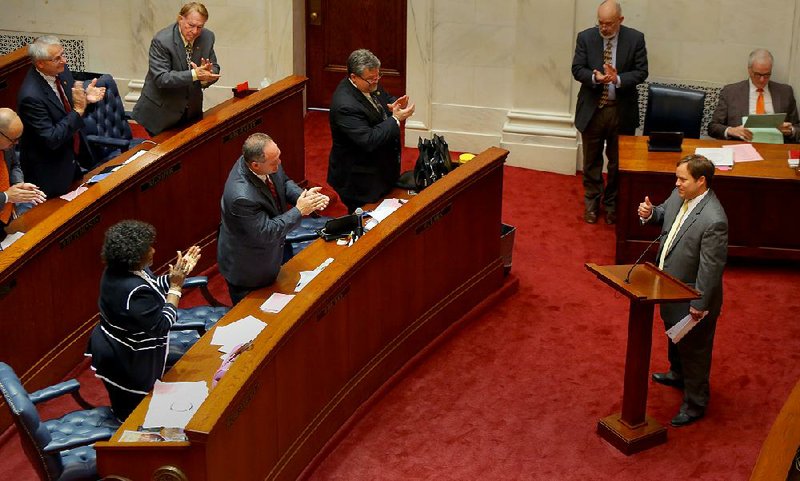Prompted by the legacy of a former Arkansas Razorback football coach, the House of Representatives on Friday pushed through a bill aimed at strengthening publicity rights and making them legally transferable even after an individual's death.
RELATED ARTICLES
http://www.arkansas…">Highway bill now just shy of Senate OK http://www.arkansas…">State Capitol news in brief http://www.arkansas…">Government efficiency bills fly, but with grease, grumbles http://www.arkansas…">State government efficiency provisions
By a 64-21 vote, lawmakers approved House Bill 1002 -- known as the Frank Broyles Publicity Rights Protection Act -- which will forbid individuals from using another's name, signature, voice or likeness for their own commercial gain.
A Senate version of the bill also cleared that chamber, 29-2.
It was the second legislative session in which the bill's sponsors, Sen. Jon Woods, R-Springdale, and Rep. Greg Leding, D-Fayetteville, passed the legislation.
During the 2015 legislative session, the measure cleared both legislative chambers but was the only bill vetoed by Gov. Asa Hutchinson, out of concerns that the language was too restrictive of some professionals, specifically photographers, and their First Amendment rights.
The current version was amended to Hutchinson's approval and gained support from photographer groups and social media companies, as well as the Motion Picture Association of America. It is opposed by professional athlete organizations.
It allows a range of exemptions for media and other creative content producers while conferring publicity rights to a particular likeness for up to 50 years after the individual's death.
The measure provoked little debate on the floor, save for Rep. Kim Hendren, R-Gravette, who poked fun at his own "celebrity" while questioning the need to take up a measure that claimed to defend the celebrity of others.
"I'm just wondering what the emergency is. ... I haven't written a book yet. And they haven't done a documentary on me yet. But I just wonder what the emergency is that brings this type of legislation into this special session," Hendren said. "I wonder how much it costs us a day to protect my earnings from my future book sales."
Leding pointed out that the Broyles bill was not the only thing brought up in the special session. The main purpose of the special session was highway funding, but about a dozen other items were on the governor's agenda.
"As for a sense of urgency, right now, Minnesota lawmakers are scrambling to address this issue after Prince's death," Leding said. "The Broyles family brought this to [Woods'] attention. ... should Coach ever decide to leave us, and I sure hope he doesn't, but that's why we're here today."
That effort in Minnesota fell apart about the same time Leding invoked it. Friday morning, legislators in the Land of Lakes pulled the bill from consideration after much debate over the intersection of free speech and rights to one's own likeness.
Woods said Friday that the Minnesota lawmakers pulled the bill because of provisions pushed by professional athlete unions. It was those same unions whose provisions led to Hutchinson's 2015 veto. They oppose the current version of the Broyles bill because they feel the many exemptions included in the bill make it even harder for athletes to protect their own likeness.
Rep. Doug House, R-North Little Rock, also opposed the legislation. House was one of the no votes Friday and the lone no vote against the measure in the House Judiciary Committee on Friday.
He said he had heard from business owners, including a shooting-range owner, who were worried that they may get sued by simply posting photos of individuals on their own businesses' websites or social media pages.
"This is a whole change in the common law that we operate under which goes back to, really, the year 1066," House said. "Now we're introducing a state law that's going to jumble up. ... It creates uncertainty in the business community and even the artistic community. It's a chilling effect on the First Amendment."
A Section on 05/21/2016


